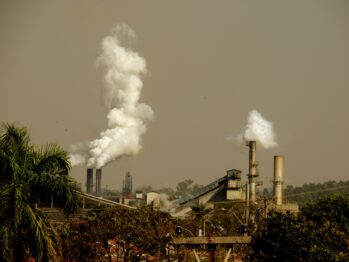In July 2024, the Energy Policy Institute at the University of Chicago launched the EPIC Air Quality Fund. The Fund aims to help communities in regions facing high pollution but low resources address the issue to close data gaps and accelerating clean air action.
Just one year in, Awardees are already helping to shape national policy, launching first-of-their-kind monitoring systems, and building open data ecosystems in some of the world’s most polluted—and under-resourced—places.
- 31 Awardees in 19 countries are working toward launching open data to drive national-level air quality improvements.
- 26 percent of all fully open, real-time air quality data in Africa on the OpenAQ platform are being generated by EPIC Air Quality Awardees.
- $1.13 million invested across Africa in the last 12 months—nearly 5x the annual average of global philanthropic funding for clean air work on the continent, according to data from the 2024 Clean Air Fund Report on global air quality philanthropy.
- All Awardee-generated data is required to be shared publicly under Creative Commons licenses that can be accessed via platforms like OpenAQ.
See where Awardees are working – and where opportunities still remain
Highlights from around the EPIC Air Quality Fund Awardee Community:
 Turning Data into Policy in The Gambia
Turning Data into Policy in The Gambia
The non-profit Permian Health, led by pulmonologist, Dr. Sunkaru Touray, has helped spur the drafting of Gambia’s first-ever national environmental legislation, currently making its way through parliament. This follows the group’s launch of the country’s first air quality sensor network and Gambia’s first reference-grade instrument, in collaboration with the National Environment Agency of The Gambia.
 Launching real-time data where there was none in Democratic Republic of the Congo
Launching real-time data where there was none in Democratic Republic of the Congo
KINAQ/WASARU launched the country’s only public air quality monitoring network, with data openly shared on OpenAQ. They’re now partnering with key government agencies and contributing to a draft national decree on environmental standards—particularly the National Sanitation Policy, including air quality—for the first time. Read more.
 Sharing government data where it had not been shared openly in Pakistan and Ghana
Sharing government data where it had not been shared openly in Pakistan and Ghana
The Urban Unit, a government-related entity, deployed 160 monitors across 10 cities—a critical step toward building Pakistan’s first open, government-led air quality dataset in a country ranked among the top 5 most polluted globally. Combining all EPIC Air Quality Fund Awardee’s efforts in Pakistan, they represent 93 percent of all open data available in Pakistan on the OpenAQ Platform.
 The Ghana Environmental Protection Authority has installed 7 monitors in the city of Tema, expanding basic data access to the public. This installation represents the first openly shared real-time air quality data for Tema by the Authority.
The Ghana Environmental Protection Authority has installed 7 monitors in the city of Tema, expanding basic data access to the public. This installation represents the first openly shared real-time air quality data for Tema by the Authority.
 Building a better global air pollution ecosystem
Building a better global air pollution ecosystem
Awardees and NASA’s Pawan Gupta and Junhyeon Seo explore collaborative possibilities of using Awardee data to inform global air pollution forecasting models in this “Behind the Scenes” conversation.
The Pakistan Air Quality Initiative, an Awardee, shared insights with the full Awardee cohort on how to optimize monitor density in urban areas, a burning question for many air quality data projects getting off the ground.
What’s Ahead
- The next round of EPIC AQ Fund Awards is expected to launch in mid-2026.
- Geographic priorities will be shaped by an updated version of our Opportunity Score framework that identifies where small, strategic investments can have the greatest return on social investment. Here is our previous analysis.
Thank you to all in the community who have been supporting this work, and a special thanks to our donors, Open Philanthropy, Alpha Epsilon, Jascha Hoffman Giving Fund, Joseph and Michelle Verbrugge, Anne Germanacos, John Davidson and Anonymous Donors, for making these activities possible.















